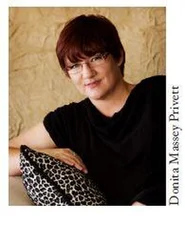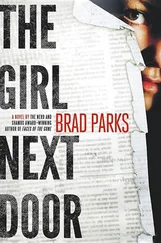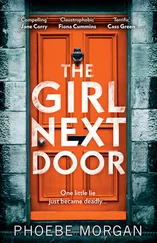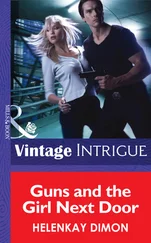‘No, I can’t. It’d spoil the album.’ George looked around him. ‘You want to see any more? I ask because my leg’s giving me hell.’
‘Give it here,’ said Maureen. ‘Let Alan and Rosemary have a closer look.’
She lifted the album and laid it across Alan’s knees. ‘Robert took some more of the tunnels on the next page,’ said George.
Alan turned it over and there she was, sitting on a pile of bricks with Stanley on one side of her and Michael Winwood on the other. She was wearing a summer frock and her hair, a nearly black dark brown, hung in ripples over her shoulders and halfway down her back. Alan started at the sight, something like a shiver, sudden enough to make Rosemary turn on him a look of concern. That hair – she sometimes wore it in pigtails and the waves appeared when the plaits were undone.
‘There she is,’ said Stanley, craning his neck to see. ‘She doesn’t look like that now, but you can still see the young Daphne in her.’
Hurriedly Alan turned the page to a set of some ten or eleven photos of Stanley’s dog.
‘Nipper. There he is, my first dog. I reckon I’ve had ten since then, they all lived to a good age.’ Stanley sighed. ‘Alfie died last year aged eighteen. I won’t have another, not now. It’d be sad for him if I went first, and I easily might at my age.’
A thin blight settled on the meeting after that. They were old and hadn’t long to last and they shirked facing it. Alan asked where Stanley was living now and was told Theydon Bois, a not-far-distant village in the forest. He wanted to ask more about Daphne but hesitated and asked after Michael Winwood instead. North-west London, he was told, and then he stood up to go.
‘Should we get in touch with the police?’
‘Let sleeping dogs lie,’ said Stanley. ‘Or bones, should I say?’
‘Better let them know.’ George shifted his bad leg and winced. ‘I’ll tell them, if you like. I mean, I built Warlock and I’ve got those pictures. I’m the one to do it. They’re not taking my album out of the house, though.’
‘We could try to find some of the others too,’ said Norman. ‘Maureen could do that. Genius with the technology, aren’t you, Maureen?’
‘More like the phone book,’ said his sister-in-law.
CHAPTER THREE
ALAN AND ROSEMARY walked back up Traps Hill. In the days when they both belonged to the tennis club, they used to run up that hill. Now Rosemary was proud of walking up without getting more than slightly out of breath. They knew every inch of Loughton; when they were children, it had been called ‘the village’. ‘I’m just going down the village,’ you said when you went shopping.
After the meeting at a dance, the remembering knowing each other as children, the going about together and getting engaged, they had married and bought a house in Harwater Drive; later, when the children came along and Alan was doing well, a bigger and better one in Church Lane. The pretty fields and woods that had begun where the best road of all met the top of The Hill and Borders Lane had all been built on, acres and acres, miles and miles, and called the Debden Estate. The wealthy people of Alderton Hill shuddered at the coming of this spillover from the East End of London. Living in less prestigious but still admired and sought-after streets, the parents of Alan and Rosemary and their neighbours also shuddered. Some moved away. Out, of course, out into Essex as far as Epping and Theydon Bois, only to be deterred by the coming of Harlow New Town. ‘Nimby’ – not in my back yard – was a word that was unknown then, but Nimbys were what they were.
Alan and Rosemary got married at St Mary’s Church in Loughton High Road and Alan’s friend Richard Parr, who had also been in the tunnels, was his best man. A week later, when Alan and Rosemary were away on their honeymoon in the Isle of Wight, Richard emigrated to Canada. He and Alan kept in touch for a while, exchanging airmails handwritten on flimsy blue paper. Making phone calls was far too expensive.
Now great-grandparents – their second great-grandchild had been born three years before – Rosemary and Alan had sold the house in Church Lane, a house they had lived in for nearly half a century. They had bought it for eight thousand pounds and sold it for three million. They moved into a flat. It was a luxurious first-floor flat in Traps Hill, for they were very fit for their age and with a shiver rejected the idea of sheltered housing.
‘I’ve got something to tell you,’ said Freya, their younger granddaughter. A social worker and sometime psychotherapist, she was in Loughton for a conference in the Lopping Hall. ‘I’m getting married.’
Alan said, ‘Congratulations. Or should I say “best wishes” when it’s the bride?’ but Rosemary said, ‘Is it David?’
In a sharper tone than usual, Freya said, ‘Well, considering we’ve been together for five years, of course it is, Gran.’
Having no champagne, Alan poured three glasses of sherry. It seemed to be turning into a sherry day. Freya looked at her glass suspiciously before she sipped the contents. It occurred to Alan that she might never have tasted sherry before.
‘Mind you come to our wedding. It’ll be sometime in July,’ she said as she was leaving.
‘It used to bother me a lot,’ said Rosemary, ‘her living in – well, in sin.’
‘That’s a very outdated expression. Her parents lived together before they married and so did her sister and Giles. Things have changed. Norman Batchelor lives with a woman he’s not married to.’ Alan searched for a word. ‘It’s perfectly respectable these days.’
‘Not to me,’ said Rosemary, adding, ‘I don’t want the rest of this sherry. We’re drinking too much.’
Alan said nothing. He had thought of taking Rosemary out for supper, maybe to the King’s Head, but her moralistic attitude, very much in evidence recently, changed his mind. ‘Do you think we’ve led a dull life?’ he asked her. ‘I mean, marrying early, two children, staying married, me working nine till five, you a housewife, gradually moving up the property ladder but never moving out of Loughton. We’ve been abroad, but only to France and Spain. We’ve never even been to America.’
‘What are you getting at, Alan?’
She rarely called him by his given name. It was always ‘darling’ or ‘dear’. ‘I just asked if you thought we’d led a dull life.’
‘Well, I don’t think so. I’d have said we’ve had a happy life, not very adventurous, but those sort of lives are full of trouble. We haven’t committed adultery or gone in for domestic violence or anything like that. We’ve brought up our children decently. What’s wrong with that?’
‘Nothing,’ he said, but he thought, ‘Everything.’
He took a pack of smoked salmon out of the fridge and made scrambled eggs to go with it while Rosemary pinned and then tacked up the sleeves of the dress she had been making for Freya that morning.
George Batchelor could manage an invoice or a receipt, but when it came to a letter, he got Maureen to do it for him. She took the photograph of George and Stanley and Norman and Moira and the possible Bill Johnson to the instant print place in the High Road and had it photocopied. She addressed her letter with enclosure to The Chief Investigating Officer, the Metropolitan Police, and took it to the police station in Forest Road herself. Once she was there, she might as well pay her monthly or sometimes weekly visit to Clara Moss, who lived higher up the road. It was a call of duty, not pleasure, and George usually did it. He didn’t mind it, enjoyed it, she thought. But he wouldn’t be able to do it until his leg was better, so she had taken over. He said it was the least he could do for poor Clara, but Maureen knew it made him feel quite young, or at least middle-aged. Though he was old, Clara was even older, must be getting on for ninety.
Читать дальше












